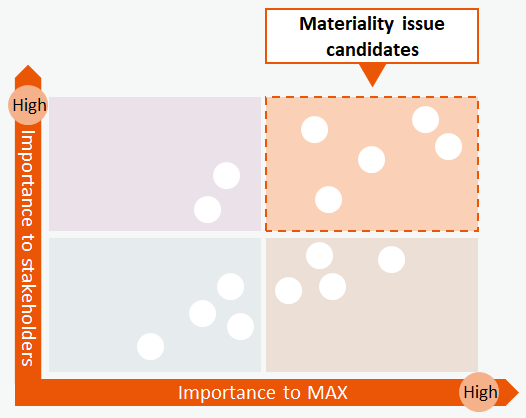Materiality(Priority Issues)
MAX has identified five materiality issues that are important to stakeholders while also having a significant impact on the management of the Company.
Identified materiality (priority issues)
| Materiality | Focus themes | Company goals | Indicators | Results| Targets |
| ||
|---|---|---|---|---|---|---|---|
| Fiscal 2020 | Fiscal 2021 | Fiscal 2022 | |||||
| Realize a company that allows people to participate |
|
|
|
- | - | 〇 | Above-average scores |
management positions |
- | 6.4% | 6.1% | 10% by 2030 | |||
recruitment for new graduates |
24.4% | 12.8% | 18.9% | 20% | |||
incidents |
0 | 0 | 0 | 0 | |||
(Unit: hours) |
1,929 | 1,941 | 1,901 | Below 1,900 | |||
| Contribute to a sustainable global environment |
|
|
|
15,177 | 15,236 | 15,428 | 50% reduction by 2030 vs.FY2018 |
|
2,482 | 2,589 | 2,515 | 30% reduction by 2030 vs.FY2018 | |||
|
95.5% | 95.2% | 93.6% | - | |||
| Drive innovation to realize "Making work life easier and more enjoyable" |
|
|
R&D expenses (Unit: billions of yen) |
4.89% 3.12 |
4.68% 3.46 |
4.60% 3.87 |
- - |
| Ensure responsible supply |
|
|
|
0 | 0 | 0 | 0 |
| Maintain and strengthen governance |
|
|
of Board of Directors |
Implemented | Implemented | Implemented | Ongoing |
violations |
0 | 0 | 0 | 0 | |||
Materiality (priority issues) identification process
In identifying materiality, we have referred to international frameworks such as the SDGs, the United Nations Global Compact, ISO 26000, and the GRI Standards, as well as wide-ranging stakeholder perspectives and the perspective of impact on the Company.
In addition, we conducted questionnaires for officers and employees and held multiple active discussions, both internally and externally, such as exchanging opinions with outside directors and outside experts, and then identified materiality by receiving approval from the Board of Directors.
We established the Sustainability Subcommittee, primarily consisting of executive officers, which referenced and analyzed international guidelines such as ISO 26000, the GRI Standards, and the SDGs, to select social issues.

From among the social issues selected in Step 1, highly important issues were determined from the two perspectives of "importance to stakeholders (society)" and "importance to the MAX Group."
We examined measures for the issues determined in Step 2, while also considering their relevance to the Medium-Term Management Plan. At the same time, to confirm the appropriateness of the evaluation, we requested the opinion of outside experts and conducted a review of the issues.
On the basis of the deliberation and examination by the Board of Directors, MAX identified the materiality (priority issues) that it should engage with through its business. We will continuously review these going forward, based on the status of the initiatives and the business environment.
